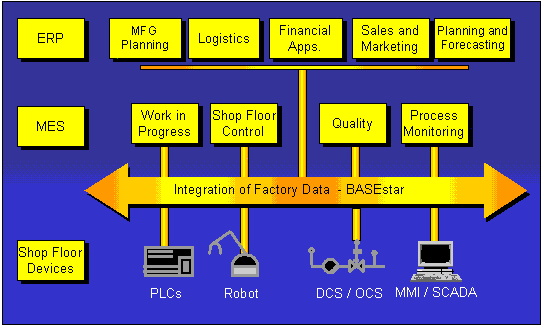|
BASEstar provides a set of core services that enable applications to be developed quickly and without complexity. All data is memory resident for fast access.
BASEstar services include
- Data Management Services
- Event Management Services
- Packet Management Services
- Application Management Services
- Device Management Services
The diagram below shows BASEstar integrating manufacturing applications and plant equipment in a distributed, plant-wide, networked environment.

Data Management Services
BASEstar Data Management Services provide a standard mechanism for defining, organizing, and accessing data in a distributed manufacturing environment. A variety of data sources are supported,
including plant devices as well as area, plant, and work cell applications.
BASEstar defines discrete elements, called Data Points, to contain manufacturing information. Data Point definitions can be of various types, ranging from scalar data elements to user-defined data
structures, supporting the many different types of data typically present in industrial plants.
Data Points are referenced by name, so applications are independent of their data sources. Consequently, they do not require alteration when data sources change. In addition, simple Data Points can
have initial values specified at startup time. The value of a Data Point can also be derived from the value of another Data Point, either directly, or modified by an arithmetic or logical expression.
Applications can define and manage Data Points using Data Management Services.
Each Data Point can be associated with one or more Triggers. A Trigger defines a relationship between a Data Point, a Filter, and an Event. Each time the value of a triggered Data Point changes,
associated Filter expressions are evaluated. Whenever the Boolean result of an evaluated Filter expression is TRUE, BASEstar declares the associated Event.
Likewise, the Timer object allows you to apply a time-based conditions to the execution of an action. You can define the time condition as an absolute date, a time interval, or a combination of the
two. When the Timer expires, BASEstar sends a message to associated objects. Timers can be associated with Trigger objects.
A Data Point value can have one or more versions. In addition to the value, each Data Point version includes the time when the Data Point value changed, and its status at that time. BASEstar
generates a new version of each Data Point every time its value changes. Applications can acces the current version or the value associated with any cached version at any time.
Event Management Services
BASEstar Event Management Services allows applications to subscribe to one or more Events. Events are occurrences that are of interest to an application program, such as exceeding a threshold,
triggering an alarm, or completing a job.
When an Event is declared, Event Management Services create and deliver notifications to subscribers. Event definitions contain specifications of the context information to be passed, including data
values and data types.
Packet Management Services
BASEstar Packet Management Services allow the exchange of Packets of information directly between users. Users establish direct communication through Ports; one user connects to a Port to send a
Packet, and the other user connects to the same Port to receive it. Packets include descriptions of the information they contain. Each Packet input and output parameter is described by a data
type.
BASEstar delivers Packets to Ports in a protocol-independent manner, and also independent of the locations of the users and Ports.
Application Management Services
BASEstar Application Management Services provide functions for managing and coordinating manufacturing applications, which may be standalone or distributed across the Nodes of a network.
Application Management Services allow users to organize application Activities into hierarchical structures that support startup and shutdown of synchronized application Activities, based on
user-defined policies. Application Activities can be executed, suspended, resumed, and terminated.
BASEstar monitors the status of all Activities and network Nodes. If an Activity or a Node fails, any of several recovery policies can be invoked. For instance, in case of a Node failure,
applications running on that Node can be restarted automatically on alternate Nodes.
Device Management Services
BASEstar software enables applications to interact with plant devices without knowledge of physical device characteristics such as location, protocol, or device-specific data formats. Physical
devices are modeled in compliance with the MMS standard (Manufacturing Message Specification ISO 9506). Devices are accessed through specific device access software (DAS), which provides operations
such as reading and writing simple and structured data via specific device protocols.
HP is committed to protecting your privacy. Learn more.
» Send Feedback
|